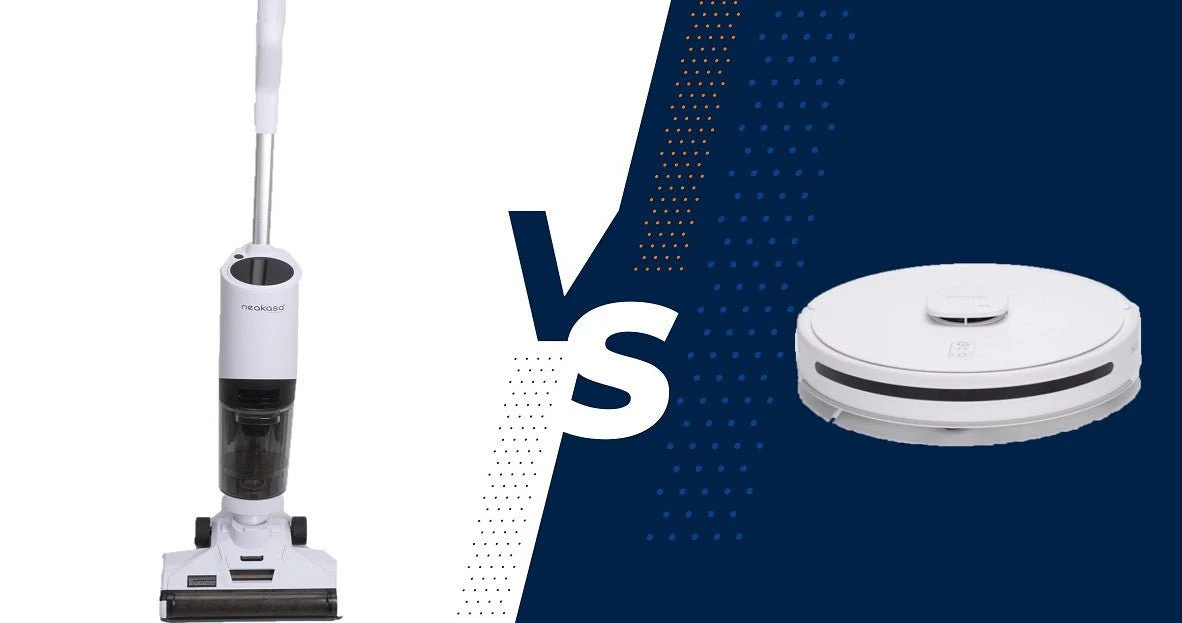Bevezetés a Automatic Vákuum vs. Hagyományos porszívók
A porszívózás szükséges háztartási munka, de a technológiai fejlődés megkönnyítette. Az egyik ilyen újítás az automata porszívó, közismert nevén a robotporszívó. Ebben a cikkben összehasonlítjuk az automata porszívókat a hagyományos porszívókkal, kiemelve azok előnyeit, korlátait és legfontosabb különbségeit, hogy segítsünk Önnek tájékozott döntést hozni otthona számára.
Mi az a Automatikus vákuum?
Az automata porszívó vagy robotporszívó olyan önjáró eszköz, amelyet a padló önálló tisztítására terveztek. A hagyományos porszívókkal ellentétben, amelyek kézi működtetést igényelnek, az automata porszívók érzékelőket, szoftveres algoritmusokat és mechanikus alkatrészeket használnak az emberi beavatkozás nélküli takarításhoz. Ezek a készülékek porgyűjtőkkel vagy zsákokkal, valamint kefékkel és szívómechanizmusokkal vannak felszerelve, hogy megtisztítsák a szennyeződéseket, a port és a háziállatok szőrét a különböző padlófelületekről.
Hogyan működnek az automata porszívók
Az automata porszívók fejlett technológiával működnek. Az érzékelők segítenek a porszívónak az olyan akadályok, mint a bútorok, falak és lépcsők körül navigálni. Ezek az érzékelők olyan technológiákat használnak, mint az infravörös, ultrahangos vagy lézeres, hogy feltérképezzék a porszívó környezetét.
Az összegyűjtött adatokat szoftveres algoritmusok dolgozzák fel, amelyek létrehozzák a helyiség virtuális térképét, és irányítják a porszívó mozgását, hogy az hatékonyan fedje le a területet, és ne hagyjon ki foltokat.
Ütemezés és alkalmazáskapcsolat
Az automata porszívók egyik kiemelkedő jellemzője az ütemezés. Meghatározott időpontokat állíthat be a takarításra, így a porszívó akkor is dolgozhat, amikor Ön nincs otthon. Ez hihetetlenül kényelmessé teszi az elfoglalt háztartások számára.
Emellett egyes modellek alkalmazáskapcsolatot is kínálnak, lehetővé téve a távvezérlést okostelefonokon keresztül. A telefonjáról ellenőrizheti a tisztítási előzményeket, módosíthatja a beállításokat, és akár testre szabhatja a tisztítási mintákat.
Az automata porszívók előnyei
Az automata porszívók legnagyobb előnye a kényelem. Nem kell időt töltenie a kézi takarítással, ami felszabadítja az időbeosztását. A zsúfolt életű vagy mozgáskorlátozott emberek számára ez nagy változást jelenthet.
Kompakt kialakításuk lehetővé teszi a bútorok alatti és szűk helyeken történő tisztítást is, ahol a hagyományos porszívók gyakran küszködnek. Sok modell lehetővé teszi a személyre szabott tisztítási útvonalakat is, hogy illeszkedjen otthona elrendezéséhez.
Az automata porszívók korlátai
Számos előnyük ellenére az automata porszívóknak vannak korlátaik. A szívóteljesítményük általában nem olyan erős, mint a hagyományos porszívóké, ami problémát jelenthet, ha a szőnyegeken mélyen beágyazódott szennyeződésekkel vagy háziállatok szőrével van dolgunk.
A bonyolult alaprajzok, szűk terek vagy zsúfolt területek is nehézséget okozhatnak számukra. Bár az érzékelők segítenek a navigálásban, nem tökéletesek, és előfordulhat, hogy kihagynak területeket vagy elakadnak. Végül pedig az automata porszívók általában drágábbak, mint a hagyományosak, így nagyobb beruházást jelentenek.
Mi a hagyományos porszívó?
A hagyományos porszívó kézi működtetésű készülék, amelyet padló, szőnyegek és egyéb felületek tisztítására terveztek. Egy motoros szívóegységből és különböző tartozékokból áll, amelyek sokoldalúságot biztosítanak több felület, például kárpitok vagy függönyök tisztításához. A hagyományos porszívókat tolni vagy húzni kell, így teljes mértékben Ön irányíthatja a tisztítási folyamatot.
A hagyományos porszívók előnyei
A hagyományos porszívók szívóerőben jeleskednek, így ideálisak a vastag szőnyeggel vagy nagy mennyiségű szennyeződéssel és törmelékkel rendelkező otthonok számára. Rendkívül hatékonyak a mélytisztításban, különösen a nagy forgalmú területeken.
Különböző tartozékokkal is rendelkeznek, így nem csak padlótisztításra alkalmasak. Akár kárpitot, drapériát vagy lépcsőt kell tisztítania, a hagyományos porszívók a felületek széles skáláját rugalmasan kezelik.
A hagyományos porszívók korlátai
Bár hatékony, a hagyományos porszívók működtetése időt és erőfeszítést igényel. Ez hátrányt jelenthet a zsúfolt napirenddel vagy fizikai korlátozásokkal rendelkező emberek számára. Emellett általában terjedelmesek is, ami megnehezíti a bútorok alatti vagy szűk helyeken történő tisztítást az automata porszívókhoz képest.
Következtetés
Választás egy automatikus vákuum és egy hagyományos, az Ön prioritásaitól függ. Ha értékeli a kényelmet és az időtakarékos funkciókat, akkor egy automata porszívó ideális. Tökéletes a tiszta otthon minimális erőfeszítéssel történő fenntartásához, különösen akkor, ha többnyire kemény padlóval rendelkezik. A szőnyegek és a nagy forgalmú területek mélyebb tisztításához azonban a hagyományos porszívó erősebb szívóereje megfelelőbb lehet.
GYIK: Automatikus porszívók vs. hagyományos porszívók
- Mi az az automata vákuum?
Az automata porszívó, más néven robotporszívó olyan önjáró takarítóeszköz, amely érzékelők, szoftveres algoritmusok és szívómechanizmusok segítségével önállóan navigál és tisztítja a padlót. Minimális emberi beavatkozást igényel. - Hogyan működik az automata porszívó?
Az automatikus porszívók érzékelőket (infravörös, ultrahangos vagy lézeres) használnak a környezetük feltérképezésére és az akadályok elkerülésére. A szoftveres algoritmusok virtuális térképet hoznak létre a porszívó mozgásának irányításához, biztosítva a hatékony takarítást. - Be tudom ütemezni az automatikus porszívózást, hogy meghatározott időpontokban takarítson?
Igen, a legtöbb automata porszívó kínál időzítési funkciókat. Beállíthat bizonyos takarítási időpontokat, így a porszívó akkor is működhet, amikor Ön nincs otthon. Egyes modellek applikációs kapcsolatot is kínálnak a távvezérléshez. - Melyek az automata porszívók fő előnyei?
Az automata porszívók az autonóm működés révén időt és energiát takarítanak meg. Kényelmesek az elfoglalt háztartások számára, képesek a bútorok alatt tisztítani, és gyakran rendelkeznek alkalmazáskapcsolattal a távfelügyelethez és -vezérléshez. - Milyen korlátai vannak az automata porszívóknak?
Az automata porszívók általában kisebb szívóteljesítménnyel rendelkeznek, mint a hagyományos porszívók, ami befolyásolhatja teljesítményüket a vastag szőnyegeken vagy a háziállatok szőrén. Az összetett elrendezésekkel is küszködhetnek, és magasabbak az induló költségeik. - Mi a hagyományos porszívó?
A hagyományos porszívó egy kézi működtetésű, erős szívóerővel rendelkező készülék. Emberi erőfeszítést igényel a tolás vagy a húzás, így hatékony a szőnyegek és a nagy forgalmú területek mélytisztítására. - Milyen előnyei vannak a hagyományos porszívóknak?
A hagyományos porszívók erősebb szívást biztosítanak, így jobban alkalmasak a szőnyegek mélytisztítására. Különböző tartozékokkal rendelkeznek a kárpitok, lépcsők és függönyök tisztításához, így még sokoldalúbbak. - Mik a hagyományos porszívók korlátai?
A hagyományos porszívók kézi működtetést igényelnek, ami időigényes és fizikailag megterhelő lehet. Emellett terjedelmesebbek is, ami megnehezíti a bútorok alatti vagy szűk helyeken történő tisztítást. - Melyik porszívó a legjobb az otthonomba?
Ez az Ön igényeitől függ. Az automata porszívók ideálisak a kényelem és a tisztaság minimális erőfeszítéssel történő fenntartása érdekében, különösen a kemény padlók esetében. A hagyományos porszívók jobban megfelelnek a mélytisztításhoz, különösen, ha otthonában vastag szőnyegek vagy nagy forgalmú területek vannak.

